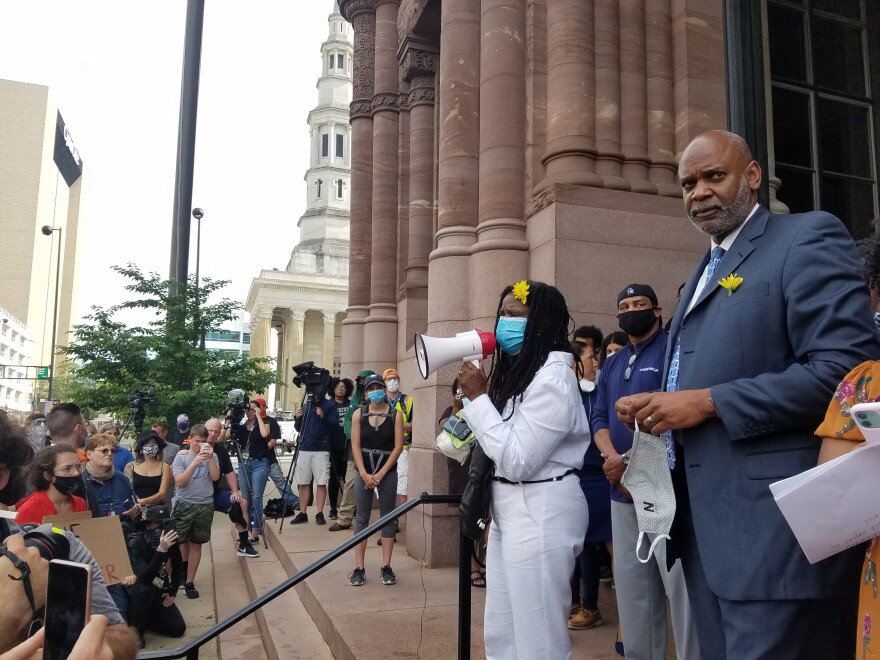The Cincinnati Black United Front and the Ohio Justice & Policy Center are adding their support to those calling for systemic changes following the killing of George Floyd and other injustices. It's a fight members of the CBUF know well and have been fighting for 20 years.
Program Director Iris Roley is a long-time community organizer and was instrumental in the collaborative agreement that came out of the 2001 protests in Cincinnati following the death of Timothy Thomas. The agreement has been held up as a model for communities across the country and it is in the process of being refreshed.
Roley spoke to a gathering of what appeared to be largely people in their late teens and twenties.
"I know everybody has a lot of feelings and thoughts," she said. "What we want to do is give you the right information so you can go back and build. This is not about what I think, this is about what I fought for. ... We want to give you the framework so you don't get divided up and nothing gets done."
She implored this new era of protestors to learn and build on what those who came before them worked for because the fight isn't over.
"I don't know anybody in the history of this country that has done the work that we have done here in Cincinnati. I know it's not enough but, please, don't stand on our sacrifices and stomp on them. Some of us too lost our spouses. Some of us lost our children in juvenile court. Some of us lost our property. Some of us lost our jobs, and then some of us lost our minds - that's how deep it is. This is not a sprint, and you all have demonstrated that you can stick it out."
The Rev. Damon Lynch argued 70% of tax dollars go toward public safety, yet African Americans and people of color don't feel safe. He called for some of those funds to be redirected to helping people police their own communities, so that "safety becomes our issue; safety becomes a community issue."
He also encouraged protestors to think about working for change, pointing to major companies headquartered in Cincinnati like Procter & Gamble and Kroger, yet there's still a lack of access to grocery stores in communities of color. The issues, leaders point out, go beyond the police to systemic injustices and disparities.
"We should have been marching well before George Floyd," Lynch said. "We should've marched on Kroger, on Procter, on (City Hall) ... on Fifth Third, because there's got to be a change and you all are the change."

He told protestors this is their time to lead, and when the marches and protests are over, he said, you can't disappear. He also warned them not to lose sight of the bigger picture. For example, he points to the changes and gentrification throughout Over-the-Rhine in the years following the 2001 protests that pushed out the people who once lived there.
"While we were marching and fighting a righteous fight and a just fight, they were planning. So now where the people that I used to pastor used to live, it's million dollar condos and sushi bars," Lynch said.
Klarke Griffith is one of the new group of young people leading protests today. "Today we are all here to dismantle a system that perpetuates unequal employment, unequal education, (and) unequal housing for people of color and black people around this world," she said. "We are here today because we are tired."
She encouraged people to vote, not just in November, but in every election to ensure their voices are heard and that people are elected who can do something about the issues at hand.
WVXU's Democracy & Me spoke with Griffith earlier in the week and you can see the video here.
Cincinnati Mayor John Cranley in a letter says he's inviting the CBUF and leaders of these new protests to discuss their recommendations.
"Let us have productive discussion(s) about what changes need to occur to move forward and how we can accomplish that together," he wrote. "It is clear that people like me need to listen."
New Demands
The Cincinnati Black United Front is issuing a set of demands they say address police accountability along with racial equity during the pandemic. Likewise, the Ohio Justice & Policy Center (OJPC) issued a set of eight recommendations for dealing with disparities made evident during the pandemic.
Civil rights attorney Al Gerhardstein says there needs to be: full funding for the Citizen Complaint Authority; bias tracking in arrest data; a youth problem solving team to help with interactions between youth and the police; a public safety academy in Cincinnati Public Schools to train homegrown first responders; a new community dialogue; and the collaborative agreement refresh begun in 2017 needs to be put on the front burner.
You can read the OJPC's recommendations below:
PRESS RELEASE: Here's an abbreviated version of the recommendations CBUF & OJPC are releasing today.
— OJPC (@ohiojpc) June 4, 2020
The full list of recommendations (which includes explanations and data) will be posted on our website shortly. pic.twitter.com/ozoKLciCWz



